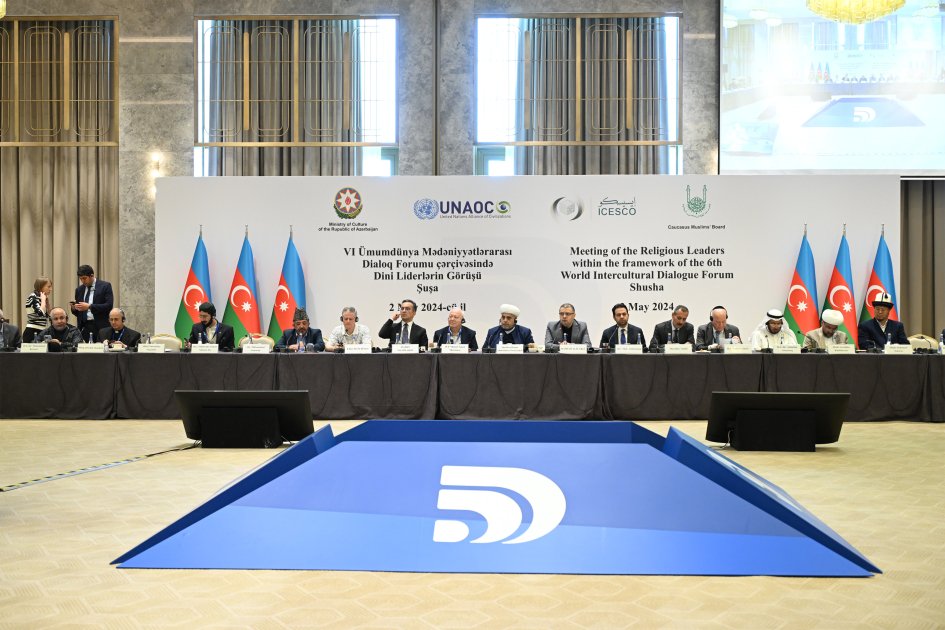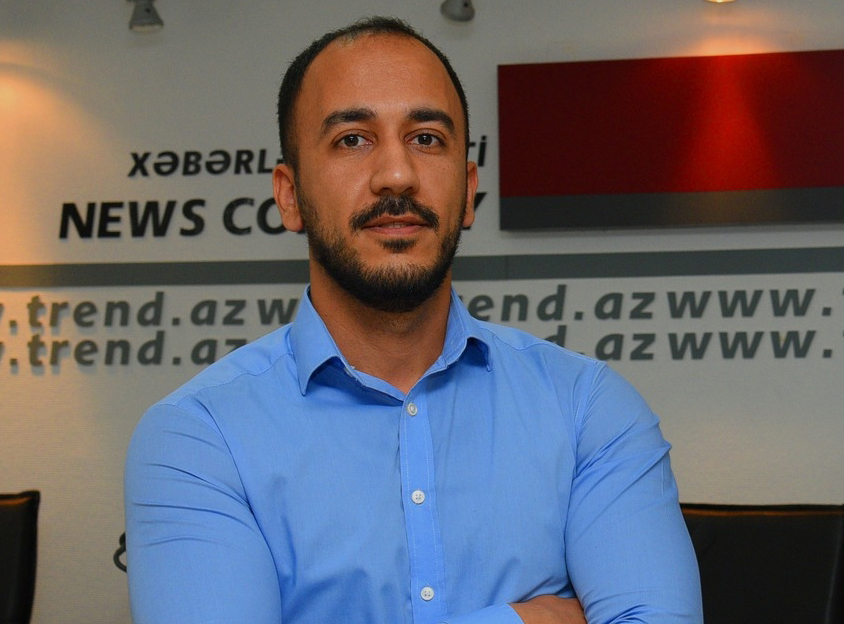BAKU, Azerbaijan, May 2. On May 2, religious leaders gathered in Azerbaijan’s city of Shusha for a meeting held on the sidelines of the 6th World Forum on Intercultural Dialogue, Trend reports.
Following the meeting, the religious leaders adopted the Shusha Declaration. The Declaration reads:
“On May 1–3, 2024, within the framework of the 6th World Forum of Intercultural Dialogue, organized under the patronage of the President of the Republic of Azerbaijan Ilham Aliyev, a plenary meeting in Baku (the Baku Meeting) on the topic “Strengthening trust through interreligious dialogue” and the Shusha Meeting of religious leaders, representing different countries, was held.
Participants in the Baku and Shusha meetings included leaders of world and traditional religions, public figures, scholars, and representatives of international and religious organizations.
- emphasized the important role of the Republic of Azerbaijan in the development of inter-civilizational and interreligious cooperation, the protection of national, cultural, and spiritual values, and the promotion of traditions of tolerance and multiculturalism at the international level;
- highly appreciating the participation and meaningful speech of the President of the Republic of Azerbaijan, Ilham Aliyev, at the opening ceremony of the 6th World Forum for Intercultural Dialogue.
We are extremely grateful for the special care and support the Government of Azerbaijan provided to the religious leaders meeting within the framework of the 6th World Forum for Intercultural Dialogue.
- emphasizing the importance of holding events dedicated to issues of interreligious dialogue and promoting the creation of an environment of mutual trust on platforms such as the “Baku Process," implemented on the initiative of the President of the Republic of Azerbaijan Ilham Aliyev, the 1st and 2nd Baku summits of world religious leaders, as well as other important forums, held worldwide – the Congress of Leaders of World and Traditional Religions in Astana, the Bahrain Forum on Dialogue, the G20 Interfaith Forum, the UN Frame Conferences on Climate Change, the Saudi Media Forum;
- emphasizing the contribution of the Document on Human Fraternity and World Peace, signed on February 4, 2019, in Abu Dhabi by His Holiness Pope Francis and His Eminence the Grand Imam of Al-Azhar, Sheikh Ahmed Al-Tayeb, to inter-civilizational and interreligious cooperation, peace, security, and human solidarity;
-expressing their deep concern about the spread of terrorism, xenophobia, religious and ethnic intolerance, and violence in the world;
- expressing the need for the international community to increase joint efforts in countering obstacles to sustainable progress, stability, and security. These obstacles include aggressive propaganda, actions aimed at undermining mutual trust between followers of different religions, calls for hatred, and inciting interreligious conflicts;
- condemning systematic and massive violations of human rights and international humanitarian law, and emphasizing the importance of joint action by the state, religion, science, and society, especially in the field of protecting the rights of women and children;
- emphasizing the need for a unanimous common position against attempts by terrorist and extremist groups to use religious sacred values for their insidious purposes;
- reaffirming the need to protect the religious and cultural diversity of the world's peoples as the greatest heritage of human civilization;
- expressing deep concern about the grave consequences of armed conflicts, terrorist attacks, and acts of violence on religious and national grounds, accompanied by human casualties, by looting and destruction of cultural and religious heritage, including the targeted destruction of monuments to the cultural and spiritual heritage of Azerbaijan, the policy of scorching and mining the lands, and ecocide and urbicide during the period of occupation of Azerbaijani territories by Armenia;
- welcoming the restoration work carried out in the territories liberated from occupation after full restoration of the territorial integrity and sovereignty of Azerbaijan, in addition to the rebuilding and construction of new cultural and religious monuments in particular;
- supporting political processes that serve peace, reconciliation, and strengthening mutual trust and coexistence in the South Caucasus region;
- underlining the statements of certain states and international and religious organizations as not conducive to stability in this region, especially the harmful trends of aggressive separatism and revanchism propagated by the Armenian Church;
- expressing the intention to hold regularly, on an ongoing basis, the interreligious events, including meetings of religious leaders in the cultural capital of Azerbaijan, Shusha, with the participation of representatives of Christian, Muslim, Jewish, Buddhist, Hindu, and other religious faiths representing different regions of the world, speaking from a unified position regarding the problems threatening the modern world;
- expressing wishes for success to the COP29 Climate Change Summit, and the hosting country, the Republic of Azerbaijan, including the “Faith Pavilion” and the “Summit of the Religious Leaders” within the framework of this important platform, which will be held in Baku in November 2024;
Call on the States, international, regional, religious, and public organizations, and religious leaders to:
- support emerging efforts aimed at immediately ending the wars and military conflicts occurring in various regions of the world at present and preventing the bloodshed of innocents and civilians;
- support the cooperation between leaders of world and traditional religions, official and public institutions, and international organizations to promote inter-civilizational and interreligious understanding, and to create an environment of peaceful coexistence by promoting the ideas of dialogue and universal humanism;
- take effective steps to prevent the misuse of the name of religion as the grounds for terrorism and crimes against humanity, discrimination, racism, harmful ideologies, and propaganda inciting violence on racial, religious, and ethnic grounds;
- condemn acts of vandalism against religious symbols, shrines, and attributes, and counter attempts to justify such actions under the guise of democracy and freedom of speech;
- the education of young people about common citizenship and the role of the media in these processes, with a view to their more active participation in countering xenophobia and discrimination;
- support the protection and respectful care of religious, cultural, and ethnic diversity;
- express deep concern about the humanitarian crisis at the level of a global catastrophe as a result of the massive emergence of refugees, IDPs, and migrants resulted after armed conflicts, persecution, and violence, and make efforts to restore their violated rights, and also eliminate the factors leading to the emergence of such situations;
- prevent harmful ideologies and hate speech that incite racial, religious, and ethnic violence through the media and information technologies, expand cooperation.
- use the potential of religions more effectively in establishing peace, global dialogue, and human solidarity, as well as in solving problems related to climate change.
We call for support for the joint activity of the state, religion, science, and public figures in the field of protecting human rights, especially the rights of women and children, in accordance with the Universal Declaration of Human Rights.
Shusha City, May 2, 2024."
Stay up-to-date with more news on Trend News Agency's WhatsApp channel







